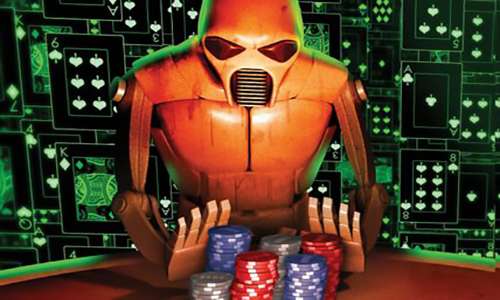Libratus Poker AI Competing Against Humans Again
In January, the poker bot Libratus took on a team of four poker pros at Pittsburgh’s Rivers Casino in a series of heads-up No-Limit Hold’em matches and won convincingly. Now the computer is going international, changing the name of its updated AI to Lengpudashi (“cold poker master”) and looking to conquer China.

RUN SOUL.READ…PRINT ALL.IN
The exhibition began on April 6th and will go for five days in Hainan, China with each of the six human members of “Team Dragon” – led by 2016 World Series of Poker bracelet winner Tue Du – playing ten hours per day and 36,000 total hands. Unlike in the previous AI versus humans match in which the human team split $200,000 for participating despite a loss, this one will be winner take all, awarding $290,000 to the champ.
Lengpudashi was co-created by Carnegie Mellon professor of computer science Tuomas Sandholm and Ph. D. student Noam Brown.
“This is an exhibition, not a match, challenge or competition,” Sandholm told cmu.edu. “We are running a relatively small number of hands, so this is not a scientific experiment like the Brains Vs. AI competition in January.”
In that January competition, Libratus/Lengpudashi took on a four-man team of Dong Kim, Daniel McAulay, Jimmy Chou, and Jason Les. During a 20-day time span, each human played 30,000 hands against the computer. 30,000 is a lot of hands, but it is still a small enough sample where luck could play a factor. In order to mitigate much of the luck factor and make the games a truer test of skill, some alterations were made to the standard Hold’em game:
• Players – human and AI – were given 20,000 starting chips with blinds at 50/100 and chip stacks were reset at the start of each hand. Thus, each side had equal footing every hand and nobody could just bully the other with a big stack.
• If there was an all-in and a call before the river, no more cards were dealt and chips were distributed based on each player’s equity in the hand. The goal here was to eliminate suck-outs and make each decision a true test of skill.
• The most interesting adjustment was that every hand was mirrored. In other words, pairs of human players were given reversed hands. For example, if Kim was dealt Queens and the AI was dealt pocket Nines, in another hand the AI would get the Queens and, say, Chou would get the Nines. With this rule, no matter the outcome, nobody could say, “Well the humans were just slapped in the face with the deck.”
We believe that these adjustments are in place for the Chinese competition, as well. It certainly would make sense.
Libratus completely destroyed the humans to the tune of $1,766,250 (play money), equating to $14.72 per hand. Here’s a look at how each player did against the artificial intelligence:
Dong Kim: -$85,649
Daniel McAuley: -$277,657
Jimmy Chou: -$522,857
Jason Les: -$880,087
Feels bad, man.
When explaining the strategy Libratus uses, Sandholm has said that there is no set strategy. The AI instead examines the specific situation it is in and makes a decision based on several options. If, say, the human raises three times the big blind pre-flop and the AI is holding T-J, it might be programmed to double the raise 20 percent of the time, raise by some other amount 15 percent of the time, call 40 percent of the time, and fold 25 percent of time (these are just numbers I’m throwing out there for illustration purposes, not based on any real data). After the matches are complete, the computer goes through its results and determines if it needs to tweak its strategy.
In its development, the AI has played billions of hands against itself to fine tune its strategy.
“I am very excited to take this new kind of AI technology to China,” Sandholm told cmu.edu. “I want to explore various commercial opportunities for this in poker and a host of other application areas, ranging from recreational games to business strategy to strategic pricing to cybersecurity and medicine.”
Libratus/Lengpudashi is not physically present in China for this contest. It is housed in a $9.65 million supercomputer called “Bridges” at the Pittsburgh Supercomputing Center.
While the overwhelming victory against the humans in January could still have potentially been because of luck, statistical analysis shows that it is extremely unlikely. At the time, PokerListings.com determined that the chances of the four humans outplaying the AI yet still losing by such a wide margin was between 0.0001 and 0.54 percent, nearly impossible. Sandholm and Brown were actually more generous to the human players calculating a 97.7 percent certainty that the AI played a more skillful game.

















COMMENTS